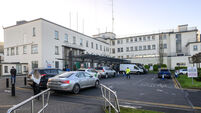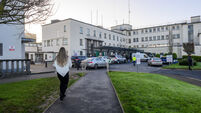'Archaic' system sees support staff assaulted at work get less leave than healthcare colleagues

Dr Laura Finnegan of the Irish Medical Organisation following a joint health committee meeting to discuss the welfare and safety of workers and patients in the public health service. Picture: Gareth Chaney/ Collins Photos
More than a third of serious physical assaults on healthcare workers were against paramedics, porters, and support staff, but these workers are only entitled to 25% of the leave that nurses, doctors, or administration staff get following an attack.
Siptu health division organiser Kevin Figgis told the Oireachtas health committee of the “unequal treatment of benefits which are afforded to support workers by their employer, even if they are assaulted in the same incident as other grades of staff”.













